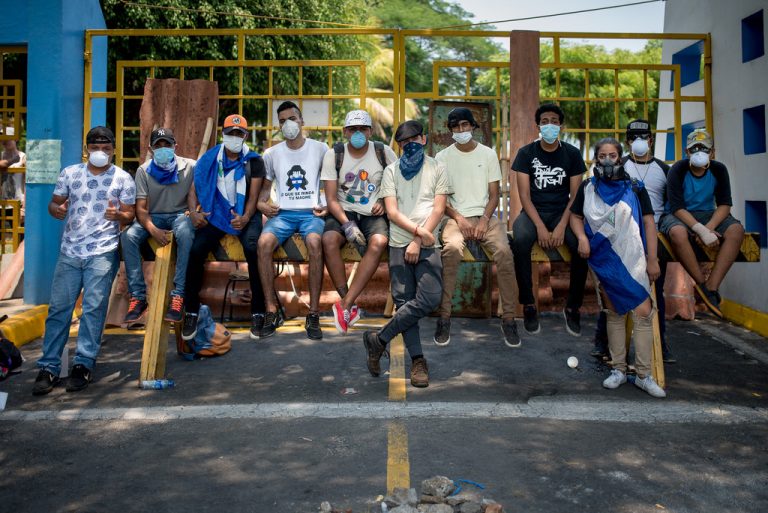
Children of Exile: The Births “Sowing Hope” in the Camp of Nicaraguan Farmers

PUBLICIDAD 1M
PUBLICIDAD 4D
PUBLICIDAD 5D
Horizontal knowledge transfer will play a critical role in the political movements of this period

Los universitarios de hoy
In July 2018, I walked across the border from Peñas Blancas into Nicaragua, at a time when the violent government crackdown on protestors and its accompanying democratic backslide was sending thousands fleeing the other direction. The rapid escalation of the situation by the Ortega regime shocked Nicaraguans and the international community alike. In response, allies recalled their ex-patriates, neighbours stressed their fear of the refugee overflow, the world looked away. I saw Nicaragua in one of its lowest, most isolated points in recent history, save present-day, and the power and resilience of the Nicaraguan people was nonetheless inspiring.
When Nicaraguans needed the international community in 2018, the help they received proved lacking. President Daniel Ortega is served well by continuing to peddle the FSLN’s anti-U.S. nationalism rife in the Cold War-era, which has seemed to mitigate the success of any recent foreign intervention, and his ties to China and Russia have safeguarded him from the full-force of Western pressure. While there was previously hope for a quieter form of diplomacy, both the fragility of the world order and callous aggressions of the Ortega regime during the pandemic pose challenges to this approach. Now, with widespread global uncertainty, the burden of this fight remains on the people of Nicaragua, but it is imperative to note that they are not alone in this.
The world is a much different place than it was during the time I spent in Nicaragua, and I am certain it will only proceed to change as drastically before the end of this crisis is in sight. Accompanying the death and economic destruction left in the wake of this virus, there also comes an insidious encroachment on civil liberties and human rights at the global level, which has snuck its way past the ever-watching liberal international order amidst the reigning chaos. There is no doubt that the pandemic has seized the world’s attention, diluting that spotlight historically shone on the retrenchment of democratic norms; the doubt lies in whether the geopolitical anarchy in which we find ourselves currently will be a lasting paradigm. There is no consensus on this, as there can’t be just yet, but there is also no liberty to wait around and see.
The democratic backslide in Nicaragua is not a unique occurrence; governments around the globe, including that of the once-bulwark of the Western liberal system, the United States, have chosen to neglect the realities of this virus in favour of opportune expansions of authority, which has the potential to reform political norms for decades to come. Simultaneously, we are witnessing mass global unrest, as populations have flooded streets in protest. While the past few months have certainly been isolating, individually and at large, the common experience of living through this pandemic has been undoubtedly uniting as well. Never in my lifetime has so much of the world been as outward-looking, our fates as connected; it is not just governments who, for better or worse, have been willing and eager to learn from the actions of one another, but individuals and movements, too.
One need not look beyond the recent spread of Black Lives Matter protests to see this connectedness in action. After a resurgence in the American media following the death of another Black American man, George Floyd, at the hands of the police, the movement quickly incited protests across all 50 U.S. states and numerous other countries worldwide. The global experience of this pandemic has increased horizontal knowledge exchange, encouraging mass participation in movements from around the globe. As an intern this summer at the Centre for Applied Nonviolent Action and Strategies (CANVAS), an NGO dedicated to making nonviolent revolution “user-friendly,” I have been amazed at the power in peer-to-peer learning, and I have no doubt of the critical role it will play in the political movements of this period in history.
Based on the success of the Otpor! movement in Serbia in 2000, CANVAS is committed to giving activists from around the world the tools to achieve nonviolent revolution. Though it has had to adapt its educational efforts to the new work landscape ushered in by the pandemic, the boom in virtual communication has provided an unprecedented opportunity to facilitate just the kind of peer-to-peer learning that the organisation promotes. As the international community is struggling under the weight of this crisis, there is a power vacuum left in the absence of its direction and CANVAS aims to fill the void with the too oft-overlooked power of the people. I am not only certain that Nicaraguans have much to learn from CANVAS’s work, but that we have just as much to learn from the Nicaraguan experience as well.
Kyra J. Colbert is an undergraduate student at Harvard University studying Government, originally from Toronto, Canada. She is an analytical research intern at CANVAS.
Archivado como:
PUBLICIDAD 3M
PUBLICIDAD 3D